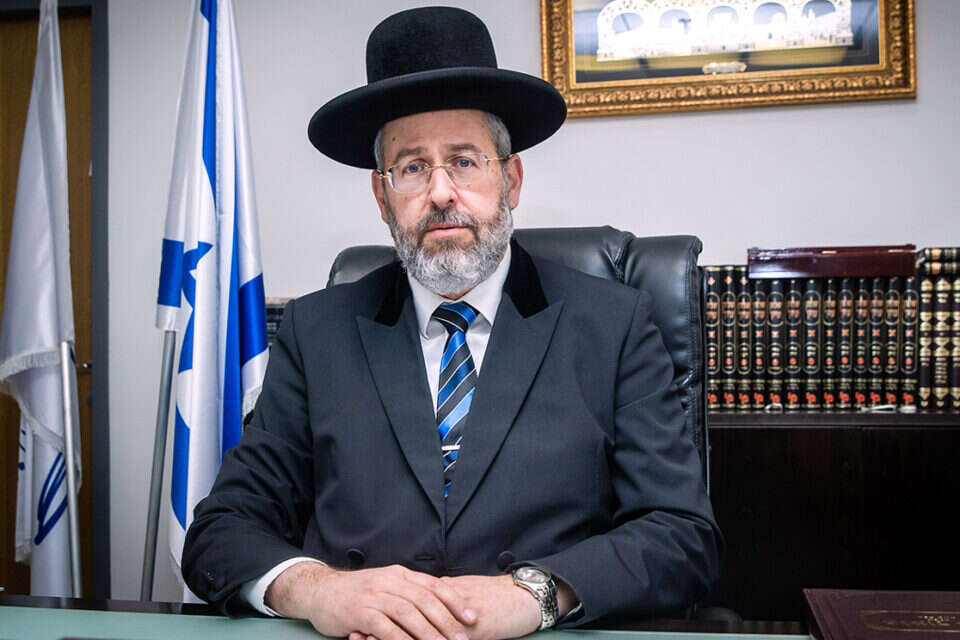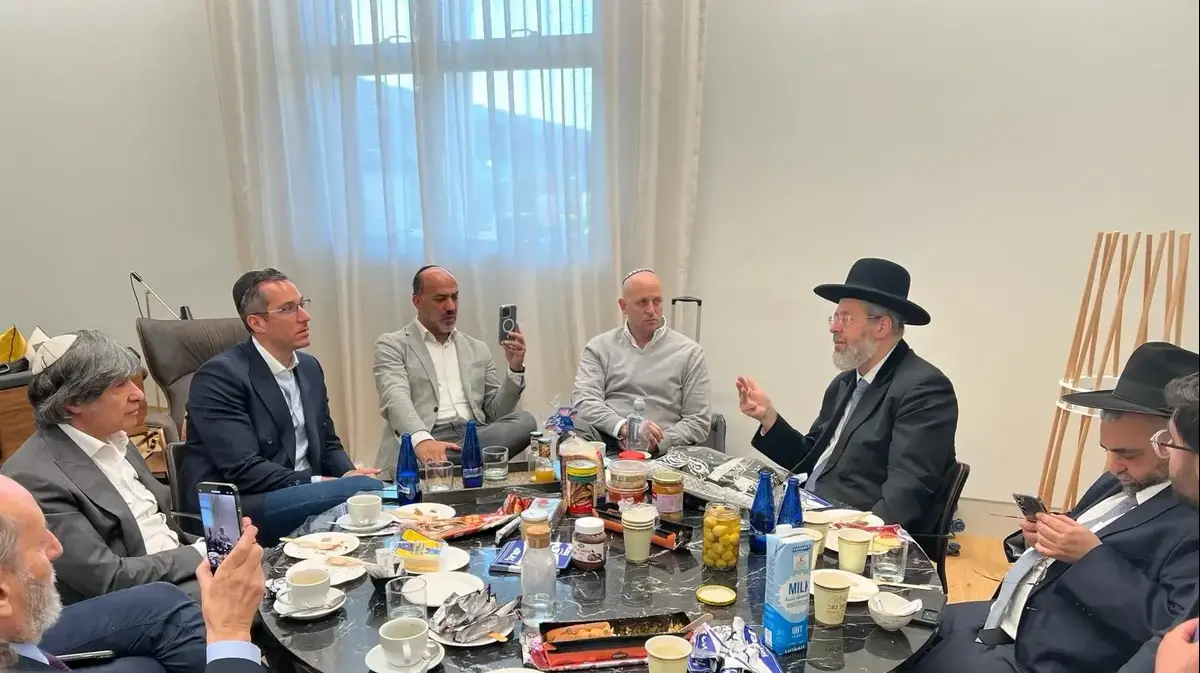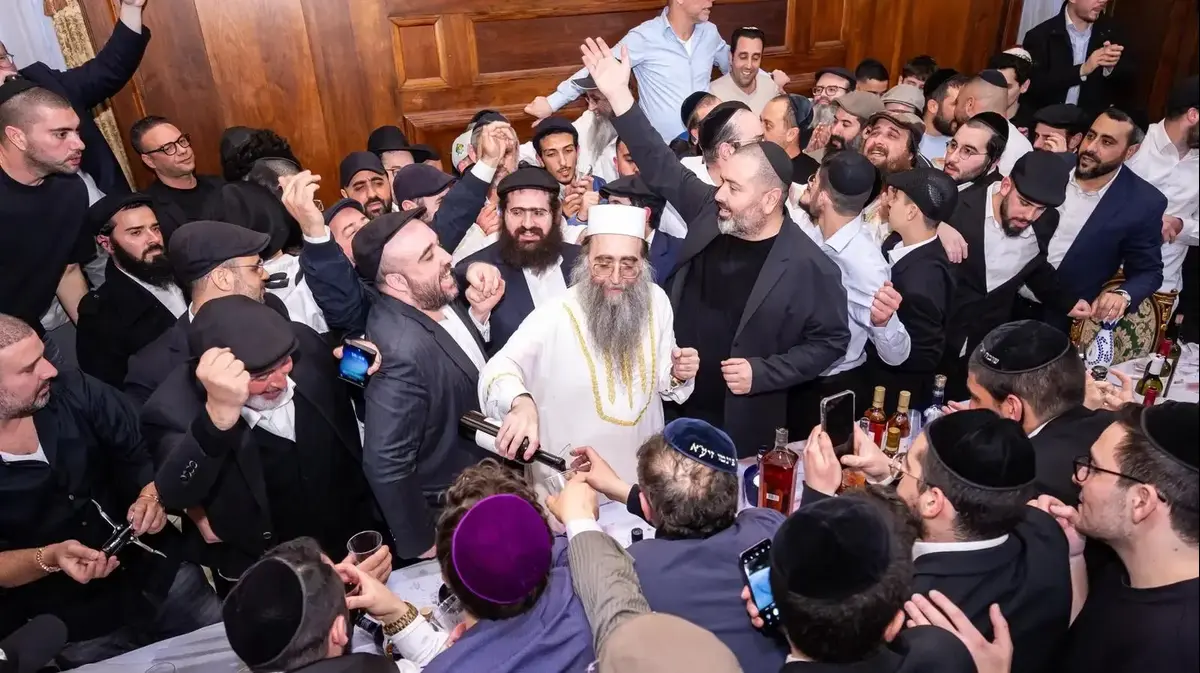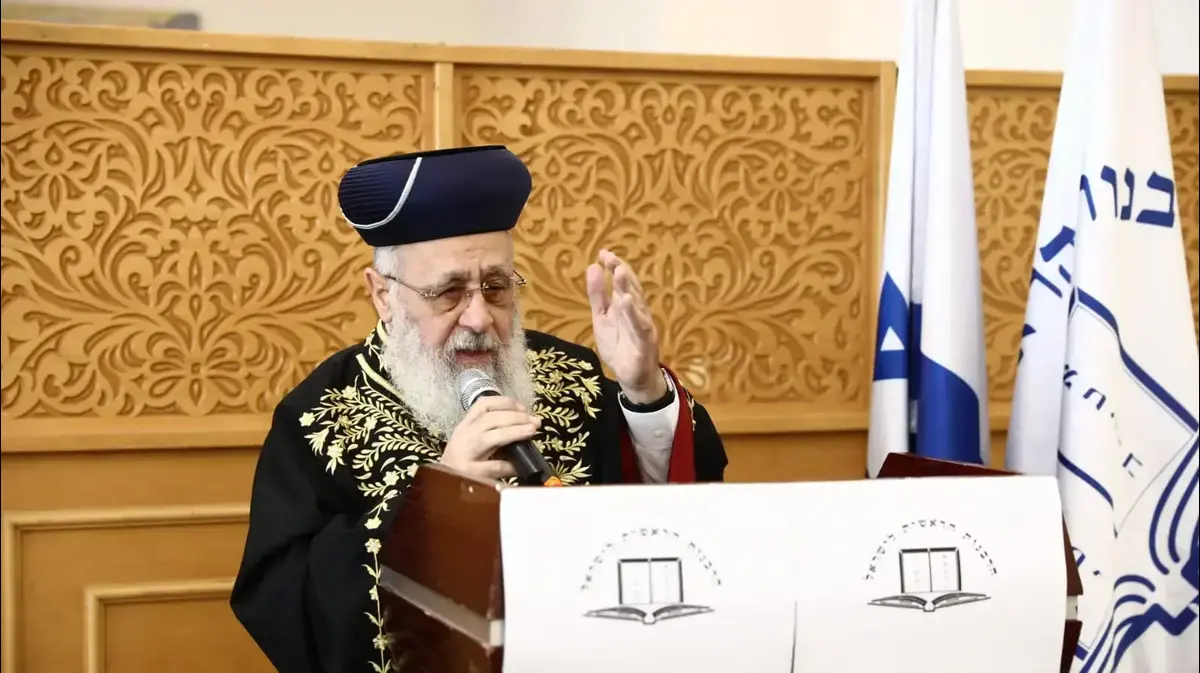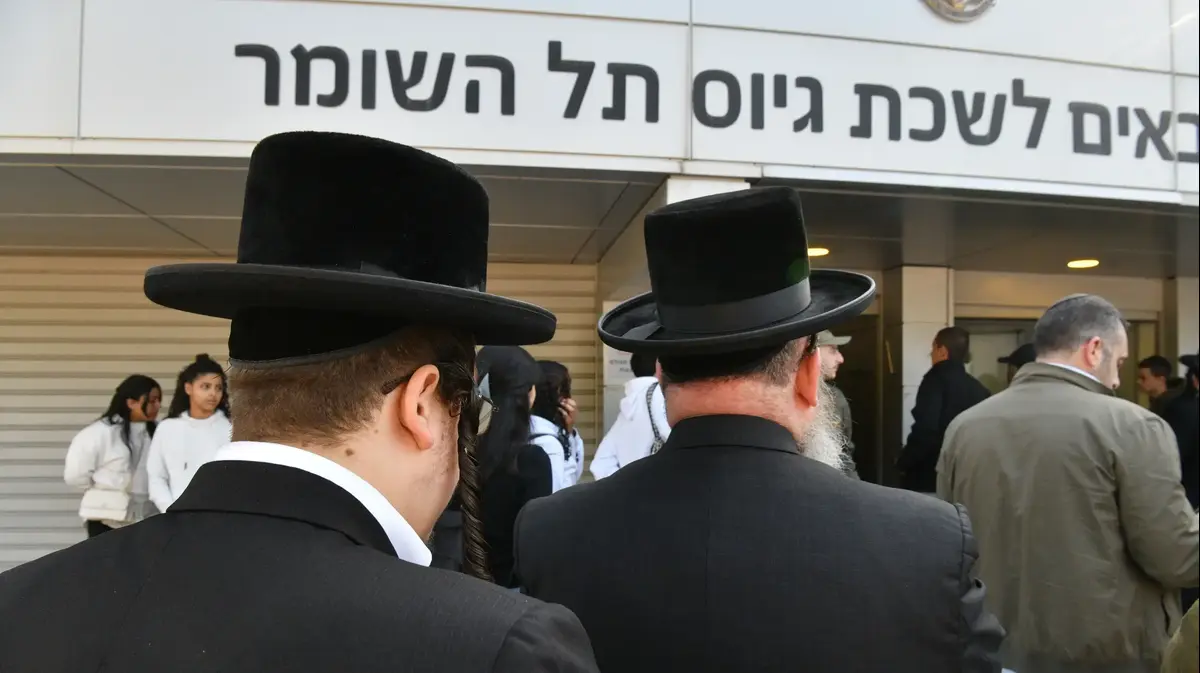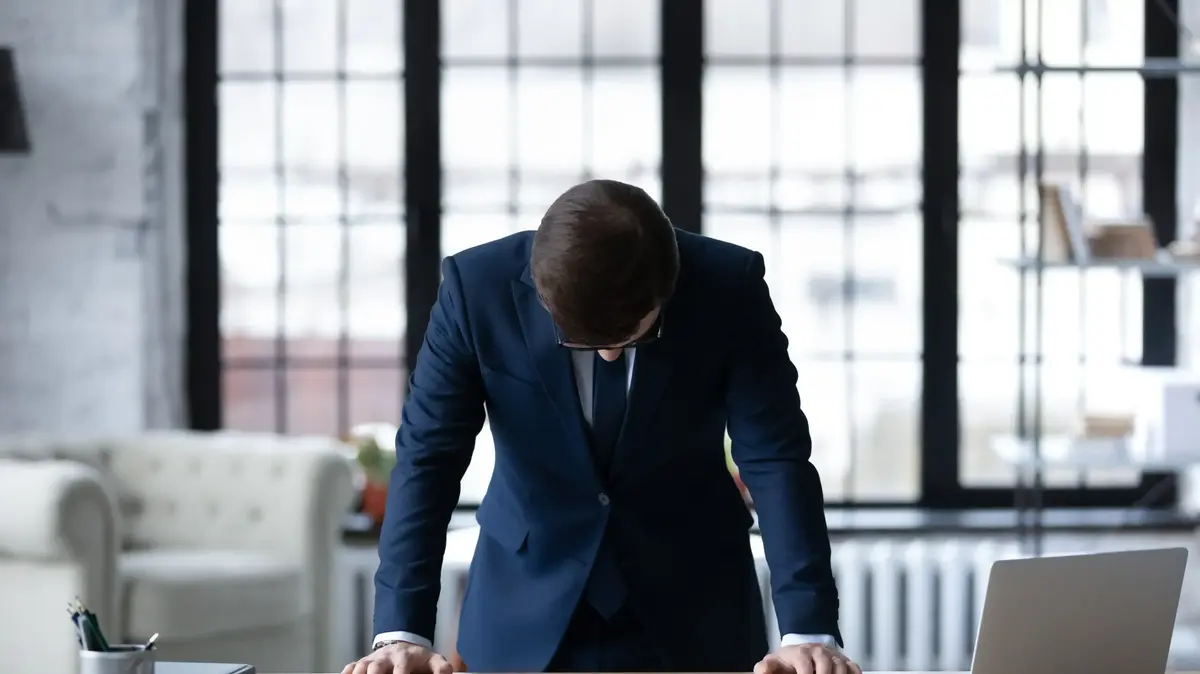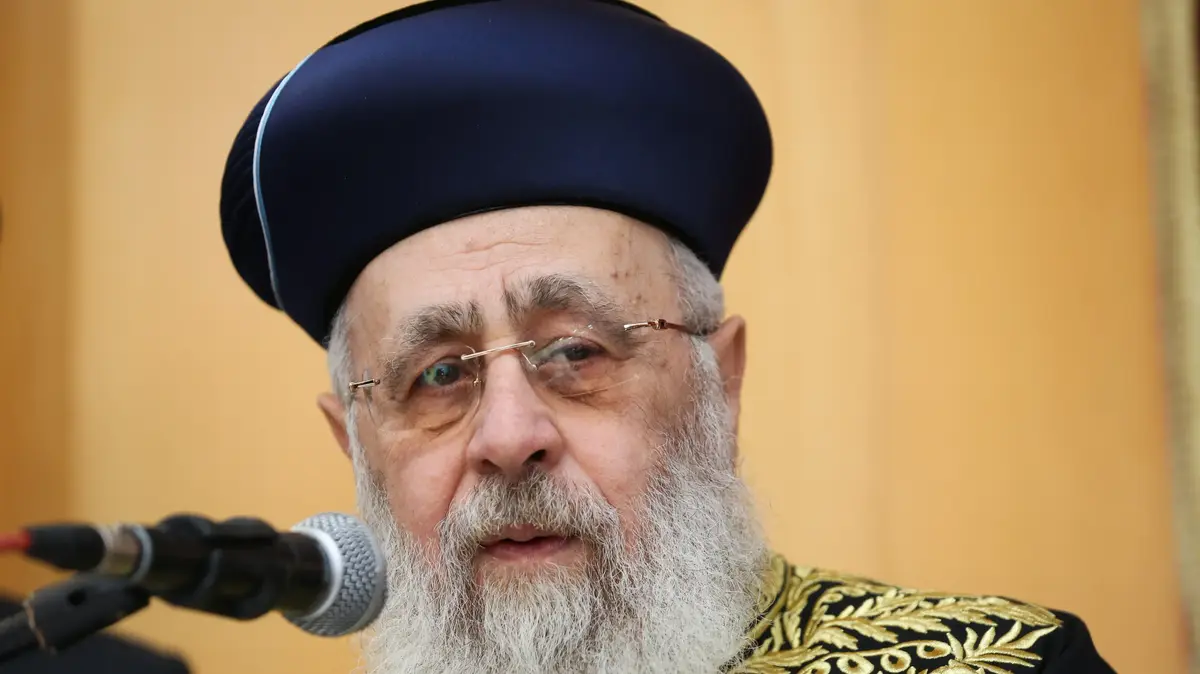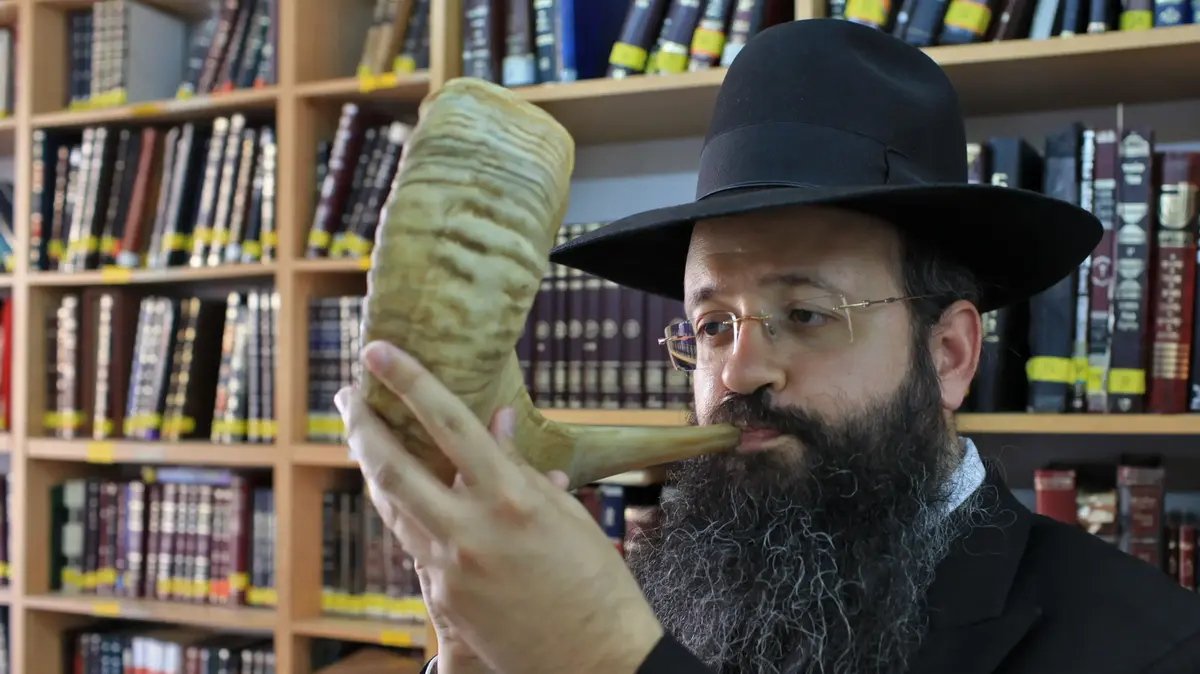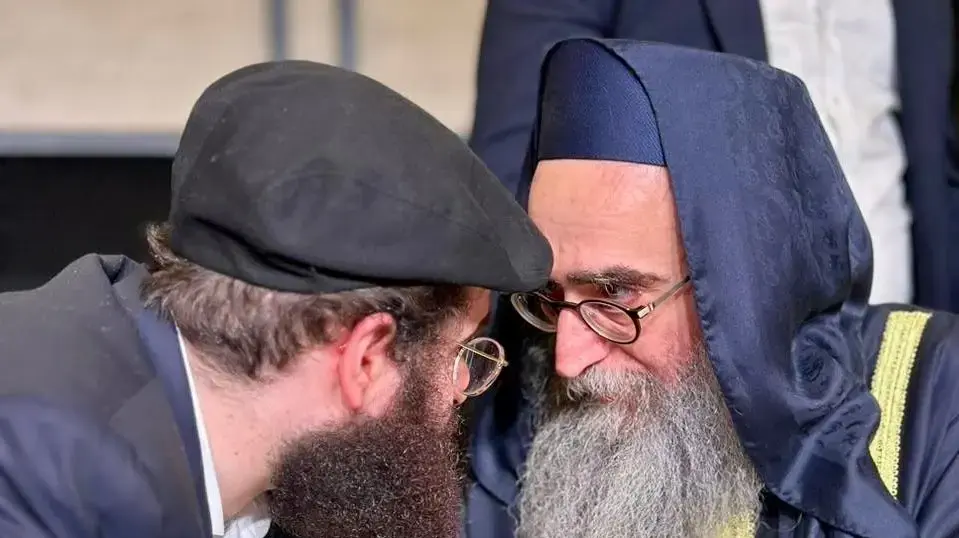"I'm a little weak yet," Rabbi David Lau apologizes at the beginning of our conversation, "a few days ago I recovered from Corona."
Hundreds of meters from the crowded Central Station, the corridors of the Chief Rabbinate's offices in Jerusalem are empty more than ever.
Rooms almost completely orphaned, empty elevators.
Most of the workers moved to work from home, and the chief rabbi was forced to do the same when he found out he was infected.
"Several of my staff members, including my driver, were found positive. My 13-year-old daughter came home from school on Thursday, and on Friday, when she did a test, it turned out to be positive. So did my wife and another daughter. For a long Saturday we sat at both ends of the living room trying to avoid "From the infection, and on Saturday night, after I caught a cold, I was tested and it turned out that I was also positive. I informed my people and went into a week of isolation."
Did you continue to work during the isolation?
"I felt very tired, but on the other hand, one morning I sat for a zoom conversation with my friend in the Great Rabbinical Court, Rabbi Eliezer Igra, and together we wrote a verdict for five hours, without a break. Then we contacted another colleague from the Great Court, Rabbi Michael Amos , And it turned out that he was also sick.Together we did quite a bit of work, without interruptions.
"I also managed to pray three times a day in the minyan. My neighbors in the building in Modi'in set up a courtyard minyan in the plaza, and despite the rain and winds, I prayed with them while standing on the balcony, so that I would not miss a prayer."
Lau (56) entered the office of the Chief Rabbi of Israel in 2013 and is due to end his ten-year term in a year and a half.
By law, he served for the first five years as president of the Chief Rabbinical Council and chief arbitrator on kosher and marriage issues, while his counterpart, Rabbi Yitzchak Yosef, served as president of the Great Rabbinical Court.
They then changed positions, and for the past four years Lau has served as president of the tribunal and handles some of the most difficult cases in Israel - refusal to divorce, docking, bastards, conversion and many other issues.
About three weeks ago, his name made headlines after a condolence visit to the home of Haim Velder's family, who committed suicide following 22 testimonies published against him regarding sexual offenses, consensual relationships, relationships with minors and sexual exploitation of minors. A few days after his suicide and the fact that hundreds of people attended his funeral, including public figures who mourned him, along with the publication of news in the ultra-Orthodox media that ignored the injuries attributed to him, a former ultra-Orthodox young woman put an end to her life. Her friends claimed she was one of Velder's victims, and was unable to cope with what happened.
A day after the funeral, the chief rabbi showed up at Welder's family home to comfort the widow and children, prompting a wave of public condemnation and claims that at best, it was a disconnect from the most senior rabbinical representative, and at worst - a blatant disregard for sexual assault.
Lau was also criticized by clerics;
Rabbis from the RCA organization, the Rabbinical Federation of America, boycotted a planned conversation with him on the subject of conversion and training.
On the other hand, media man Rani Rahav defended himself, saying that "the family is not to blame for anything, for them it has lost a father. Therefore, it is important that the rabbi is comforted."
Five days after the visit, Rabbi Lau published a letter, in which he wrote: "It seems worthwhile to make things clear. Unfortunately, there were those who interpreted the fact that I comforted mourners - widows and orphans whom I know personally, and there is no need to say in words With casualties.
"Therefore it is important for me to clarify: even these days my heart is with the victims, who are going through very difficult days, and we must all always stand by them - and at this time especially. I have full confidence in everyone who was injured. And the cry of the wounded whose souls are murdered cries out to us.
"Do not move to the agenda for any harassment or harm. These acts must be rooted out and uprooted from everything, as I have read more than once. "I have said these things at many conferences, and I will return and emphasize this at every opportunity. In the hope that such serious things will no longer be heard within our borders."
The rabbi vehemently refuses to answer questions in the Velder affair ("the issue is behind me").
Also to the question of whether he was surprised by the sharp public reaction to the condolence visit and what lessons he learned, he refuses to answer.
Regarding sexual abuse in ultra-Orthodox society, the rabbi says: "I have been dealing with this issue for many years. For example, 15 years ago, when I served as rabbi of the city of Modi'in, I sat with the rabbi of the Central District of the police and asked to raise awareness. Organized rabbinical conferences at the Ministry of Religions and stimulated them on the subject.
"In addition, when I took over as president of the Chief Rabbinate Council, I approached balanim in the mikvahs and asked them to increase their attention in order to identify sexual assaults."
And that's enough, do you think?
"I believe that this issue should be discussed and addressed, and be aware of the distress. It is clear that we must do our utmost and not hide injuries, including contacting various bodies and the police. We must be aware that such incidents can happen anywhere, and do everything to save lives. Of life. "
• • •
For the past month and a half, Rabbi Lau has been on the path of a frontal clash with the Minister of Religions, Matan Kahana, following the conversion reform that the Minister is trying to promote.
The two do not meet, and there is a rift between the parties.
According to the outline, which was first revealed in "Israel Today", city rabbis will be able to establish conversion courts, in order to significantly increase the number of conversions in the State of Israel, which currently stands at about 1,500 per year.
Today, there are about 400,000 citizens in Israel who are defined as "non-religious," most of them from the Commonwealth of Independent States, and the Minister of Religions wants to convert some of them through the establishment of conversion courts in local authorities.
Rabbi Lau reacted sharply to the publication and clarified that in his eyes it was a "spiritual disaster and a breach of halakhah ... and a grave violation of the Judaism of the State of Israel. We will fight with all our might against this dangerous initiative by all means."
According to various media reports, he even informed the prime minister that if the head of the conversion unit, Moshe Weller, was fired, the rabbi would not agree to sign the conversion certificates of Ethiopian immigrants.
But in a conversation with him he denies these reports outright and claims that this is a lie.
"I sign every conversion, and under me works the head of the conversion system, whose job is to make sure that the conversions are carried out according to my instructions. From the moment Rabbi Waller was fired, I had no way of knowing what instructions were converted, so I announced And what country did he come from. "
With Naftali Bennett in 2014.
"I am not interested in the political field, and I have never belonged to one party or another," Photo: Yonatan Zindel
Last week, a few hours before the Minister of Religions revealed the final details of the outline in a draft law, Rabbi Lau announced, in an unusual move, that he would bypass the head of the conversion system and approve any conversion himself.
Minister Kahana announced in response that the detour that the rabbi does not want to carry out is illegal.
"Illegal?"
Lao smiles.
"According to the rules of conversion, the head of the conversion system is responsible for implementing the instructions of the president of the Great Rabbinical Court - which is me. I do not understand what is wrong with checking every old case. It is my duty.
"The bill in question is going to tear the Jewish people apart. It will cause there to be at least two types of conversion, and we will have to tell people that they did not convert properly, and therefore are not Jews. To chaos, and it must not be given a hand.
"I do not intend to sign anything that I do not believe in, and if I do not believe that the conversion is real - I will not sign, sharp and smooth.
"The citizens of the state are entitled to all their rights, but a distinction must be made between citizenship and Judaism. Judaism has not changed since Mount Sinai, nor will it change in the future. There is one conversion in the State of Israel - and that of the Chief Rabbinate. "We know that our conversion certificate is a thing of the past. The new law will trample on this issue."
For years, claims have been made against the conversion courts, which make it very difficult for converts. Why not change the situation?
"There is a huge injustice done to the judges of the conversion system in this matter. So many people talk about them, and do not know who they are talking about and what they are talking about. Wise students who do dedicated work do not reject anyone and give a real and correct answer to the tribunals.The problem is not at all in the conversion system, but in the fact that more and more non-Jewish people come every year.
"If someone hurts assimilation, who will change the Law of Return with the same force and enthusiasm. According to the Interior Ministry, the vast majority of immigrants to Israel are not Jews, so why raise them and then say there is a problem? Stop it before, if it hurts so much. Why change a law that I went all out on, instead of preventing the problem in advance? "
Minister of Religions, Matan Kahana.
"He is wrong", Photo: David Cohen - Ginny
The Minister of Religions addressed the issue at a press conference and claimed that the Law of Return is indeed problematic, due to the section that allows Jewish grandchildren to immigrate to Israel.
Ironically, when an amendment to the law was passed in 1970, the NRP agreed to allow the immigration of grandchildren, as they expected that only a few would apply to immigrate based on the Judaism of the grandparents. But today many immigrants do so. Can change the law.
Supporters of the reform say that private courts, such as the "Proper Conversion" tribunal, have been operating for years and are proving otherwise. You can convert in a bright way.
"Private courts have serious problems. If a person living in Australia comes to Israel for a week and receives a private conversion certificate, it is a shame and a disgrace, a violation of the whole concept of conversion and Judaism. The court does not know where he comes from and what brings him to convert.
"There were rabbis who tried to make 'jump conversions' - went on Bezeq visits abroad to make conversions (this is, among other things, a case from 2019, in which people in the US were converted by rabbis who are licensed to do so, but it was suspected that they did not know The converts; HG).
I have announced that these conversions are not acceptable.
Do you understand what destruction this creates for communities?
A person walking around with a conversion certificate from three city rabbis in Israel.
"Once such conversions are with the symbol of the Chief Rabbinate, it will also destroy the communities in the world and also harm our communities."
Under the proposed law, city rabbis will perform the conversions. You do not trust them? After all, some of them even sit on the Chief Rabbinical Council.
"The problem is not if I believe in the rabbis of the cities, but the fact that there will be several types of conversion. What will it help me if these are the rabbis of the cities? It will destroy the entire conversion system. Look what happens here. When MK Michael Malkieli "S) stood in the Knesset and said that the city rabbis were not authorized to convert, the chairman of the Religious Services Committee, MK Yulia Malinowski (Yisrael Beiteinu), replied: 'You will teach them.'
I do not understand this contempt.
She would also bring people from the street to the hospital and say, 'Will you teach them to take care of people'?
"I need the help of the city rabbis in the field of conversion, but not in the court. There I get along, we have excellent judges. If they care so much about assimilation - they will help us with the accompaniment of Jews after conversion.
"I was the first chief rabbi to come to Kfar Etzion to sit with the soldiers of the Nativ course, who are undergoing conversion. A female soldier told me how difficult it is for her, that she is converted but does not want to be home on Shabbat because Shabbat is violated there, and none of the city rabbis invite her to Shabbat.
"I would expect the rabbis to accompany the converts after the conversion. According to Halacha, a convert should keep Torah and mitzvos, but in practice, many fail to persevere, they are poor. If you so want to be involved, help them keep mitzvos and stay in Judaism properly."
• • •
You can not ignore the fact that there are almost half a million people in Israel with the status of non-Jews. What will you do if your grandson comes home with an Israeli friend, and then it turns out that she is not Jewish?
"I hope this does not happen. I try to educate my children and grandchildren about the importance of generational tradition. But the solution is not to hand out conversion certificates without account.
"There is no doubt that we are in difficult times. I recently attended the Real High School in Haifa and explained that we are a continuation of the chain of generations, and what is the importance of tradition. ; HG) who marry Jews.
"I explained that it is not bad, but we still have to keep the tradition. We are here to have a Jewish state. True, there are cases in which Yossi turned out to be a Yusuf, but that does not mean that we will distribute conversion certificates without criteria.
"If the law passes, God forbid, I'm afraid we'll need genealogy books to know who a Jew is. Let them not tell me that it already exists today; today people from different denominations get married without any problem. I hope we do not get into situations that will bring us back to the Diaspora."
You say that if the new conversion law passes, we will need pedigrees. Minister Kahana says that if the law is not passed, we will need genealogy books in the future. Could it be that you both pour the baby with the water? Maybe collaboration is the way to improve the issue of conversion?
"With all due respect, even if the Knesset determines that a person with a fever of 43 degrees is healthy - this is not true, and even if a law is passed that does not need cement to build a building, it will not happen. Who receives the yoke of mitzvos and joins the Jewish people.
"When a child is born in the United States, he is an American.
But if a person who was not born in the United States wants to become a citizen there, he has to go through many hurdles. Whoever is born in a kibbutz is automatically a kibbutznik, but whoever wants to move to a kibbutz has to pass various tests and conditions.
"The Jewish people are no less than the American nation or a kibbutz. There is a path from generation to generation, and a line that must remain uniform. These are halakhic questions, and there is one address: the Chief Rabbinate. To know if he can drive or without the right conditions. "
So what you're saying is that this battle will continue.
"I hope that the legislators will understand that he asked them to put themselves into things that belong to the Beit Midrash, and that they must not harm the honorable conversion certificates. I hope that they will recover and strengthen the conversion system and support for converts."
• • •
Minister Lieberman claimed that you were trying to blackmail the state with threats, and called for examining the continuation of your tenure as president of the Great Rabbinical Court.
"He does not bother me. A politician says his politics, and I do my duty. I hope that tomorrow he will not ask to examine the head of Hadassah Ein Kerem's surgery department, because in his opinion he is not fulfilling his role faithfully."
Could it be personal?
"I do not feel that someone is attacking me personally, but that the chief rabbinate is under attack. It should be understood that there is a huge gap between its status in most parts of the people and its status in very certain parts of the country. I walk around the country and see At the forefront of the struggle to preserve the State of Israel as a Jewish state makes it a goal.
"After decades of debating whether it is a Jewish state, the voices of those who want a state of all its citizens are increasing. Because the chief rabbinate symbolizes the opposite, it has become a body that is beaten from all corners. There have always been attacks, but they have intensified in recent years. Superior in harsh conditions.
"But from the first rabbi of the people of Israel, Moshe Rabbeinu, we learned that there is always criticism, and we also learned that a rabbi should state his position most clearly. For some reason there are people whose belief in freedom of expression stops when it comes to rabbis. "Nothing, we will succeed in preserving Judaism."
And perhaps rabbis should not get involved in such political discussions.
"I am not interested in the political field, and I have never belonged to one party or another. But anyone who follows the world of rabbinate for generations knows that rabbis have always had to act within different bodies. There is no reason for the chief rabbinate to be different. To belong to no one. "
Lieberman.
Out against Rabbi Lau, Photo: Oren Ben Hakon
You also came out against the kosher reform, which will menu the system in a year. According to the Minister of Religions, it will enable corporations to provide accessible and better services.
"I am not currently involved in the kashrut system, but my colleague, Rabbi Yitzchak Yosef, who serves as president of the Chief Rabbinate Council. For five intensive years I have been involved in kashrut, and now I am investing in the rabbinical court.
"However, when Minister Kahana's outline was published, I wrote my position that it was a mistake and a violation of kosher. The right thing to do was to create a uniform system in Israel under the umbrella of the Chief Rabbi. I wrote a four-page letter to the Minister of Religions about the outline.
"In the 19th Knesset, when Naftali Bennett was the Minister of Religions and the Deputy Minister, Rabbi Eli Ben-Dahan, acted on the issue, I tried to make all kashrut uniform. I proposed to create one system of procedures, and each rabbi in his city would add mehadrin at his discretion, but those who supposedly wanted to amend the kashrut dropped the initiative.
"Uniform procedures would help kosher much more than a situation where a business owner would argue with one kosher body, and when it did not suit him go after another, as the kosher reform suggests. Such a thing is the destruction of kosher."
• • •
One of the main claims of the chief rabbinate's critics is that this is an outdated and inflated institution, which requires shaking up and becoming more efficient. What do you think? Does the rabbinate have problems that require treatment?
"A large part of the critics do not know and do not know what things were done in the rabbinate on a small budget. It should be borne in mind that the advertising budget of the chief rabbinate is very small, and some of the bodies fighting in the chief rabbinate have several times as many.
"There is always room for efficiency. In the last eight years, many steps have been taken to streamline, and more can always be done. At the same time, it must be said that with a small budget the rabbinate manages to do quite a bit, and I think it deserves a word of appreciation.
"Of course there are right things in the review, and I would be happy if we were given tools to do more. People need to know that some of the pages defined as the chief rabbinate are not under our control. They are the responsibility of other parties. "
What optimization steps have you taken?
"Take the rabbinate exams department, which has become unusually efficient. Instead of getting answers after a year and a half, we have detailed the issue, and today thousands of people are receiving a quick and efficient response. The issue of training and importing from abroad has also opened up.
Before I arrived, training for all of China was only given by Hong Kong supervisors.
Today, many kosher foods are recognized in China, which allows importers not to be bound by a single kosher system.
"In the rabbinical courts, we have made many changes - shortening queues, a huge investment of judges, rulings that are published and cases that are closed. There are no more cases of decades. People work hard to make all this happen."
Why do we need two chief rabbis today? Why not amend the law so that there will be one chief rabbi in Israel?
"The reality is that my diary and the diary of my colleague, Rabbi Yosef, are so busy that I think even if there were two other chief rabbis, they would have plenty of work. In the end, people forget that there is a clear division - one rabbi serves as president of the chief rabbinate responsible for marriage "For kosher and eruvin, and the second rabbi is the president of the Great Rabbinical Court. These are different positions, with different responsibilities. This is a huge burden."
With the first Chief Rabbi of Zion, Yitzchak Yosef.
"The reality is that my diary and the diary of my colleagues are so busy, it's a huge burden," Photo: Contact
• • •
Rabbi David Lau was born in 1966 in Tel Aviv to Rabbi Yisrael Meir Lau, later Chief Rabbi of Israel and Rabbi of Tel Aviv, and to Chaya Ita, daughter of Rabbi Yitzchak Yedidya Frenkel, Rabbi of Tel Aviv.
His older brother, Rabbi Moshe Chaim Lau (60), is a well-known rabbi in Netanya, who previously tried to run for mayor of Netanya and rabbi of Jerusalem.
Rabbi Lau is married to Tzipora, who is involved in education, and a father of seven.
They live in Modi'in, where Lao served as rabbi of the city for many years.
Do you sometimes consult your father, who served as chief rabbi?
"Yes, definitely. Many Jews want to consult with him, and I have this privilege on an ongoing basis. By the way, many years ago, when I was mayor, they claimed that they arranged my work because I was 'son of'. I told them that if 'son of' works all It's so hard, I have no idea what a person who is not a 'son of' does. "
With his father, Rabbi Israel Meir Lau.
"Many Jews want to consult with him, and I have this privilege on an ongoing basis," Photo: Gideon Markovich
On Rabbi Lau's desk are piles of documents from the files he manages in the Great Rabbinical Court.
Some are engaged in mooring and refusing a divorce, and others in bastards.
Every decision he makes in the case gives a new life to a person who could not marry or divorce in Israel, and alternatively, states that he and his descendants will never be able to marry a Jew according to Jewish law.
"I have some bastard bags here. Very hard bags, no one should be jealous of me. We go out of our way to try to free people from bastards, but sometimes we have to tell a person that he can not be allowed to get married. It's awful.
"We recently had six difficult cases, and in three we found a permit. In one we still do not find a permit, and in two more we are undecided. There is a case that has been open since 1991. The court in Be'er Sheva has not been able to find a permit. "The rabbinate is trying to understand what its halakhic status is. We will have to make a decision soon, and it is very difficult. These are not simple questions."
Courts have been under attack for years, arguing that they are not doing enough to free women from their docking, and that they refuse to allow mitigating solutions to free women from divorce refusals. Two exceptional cases have managed to provoke the wrath of various organizations engaged in the field. The first - the story of a violent man, hatred under pressure from the court to grant a divorce to his wife after 33 years (and the organizations have argued that this is no reason for pride on the part of the court); And the second - a story of a divorcee who escaped and was caught after seven years, and at the end of more than a hundred days in prison gave the divorce in the Great Rabbinical Court, before Rabbi Lau himself.
In a sharpened article written by the legal director of the "Justice Center for Women" organization, Adv. Nitzan Caspi-Shiloni, she came out against the court and claimed that "Israeli women deserve much more than that.
Israeli women are entitled to end their marriage with dignity, according to their autonomous decision, independent of any abusive husband and independent of an opaque system.
It is important to note that halakhic solutions to difficult situations of moorings exist, but there is a lack of motivation among decision makers in the current system to make use of them.
And the main victims are the agunot women. "
Rabbi Lau goes against these things.
"This is a complete injustice," he says.
"The dayanim invest hours and hours. There is a huge effort to finish cases and not leave cases open. There was a ruling that we dealt with the issue of difficult docking. For both of us, and we had a sitting on the bag, at 1 at night.
"בתי הדין הרבניים עושים עבודת קודש. הרוב המוחלט של הדיינים עובדים קשה מאוד, בתנאים לא פשוטים. מספר הדיינים לא עלה מאז שנות ה־60, למרות גלי העלייה והגידול באוכלוסייה, שהוסיפו עוד ועוד שאלות ונושאים.
"אתם רוצים להקל? תוסיפו דיינים, ותשוו את התנאים שבהם הם עובדים לאלה של שופטים בבית משפט. לכל שופט בישראל יש עוזר משפטי, אבל בבתי הדין הרבניים יש בסך הכל שמונה עוזרים משפטיים, שחלקם מושאלים למחלקה המשפטית ולצרכים נוספים".
• • •
הנישואים של שולי רנד לצופית גרנט, לאחרונה, העלו לדיון ציבורי רחב את אחת השיטות השנויות ביותר במחלוקת בבתי הדין הרבניים - האפשרות לתת לגבר לשאת אישה שנייה באמצעות היתר של מאה רבנים, כדי למנוע סרבנות גט מצד אשתו. רנד, שאשתו מיכל מסרבת לתת לו גט, קיבל היתר להינשא גם לגרנט, מה שהציף במלוא עוזה את העובדה שלנשים אין פתרון כזה.
הארגונים שפועלים נגד סרבנות הגט, ובעיקר "מרכז צדק לנשים" ו"מבוי סתום", טוענים כי יש אפשרות מסוימת להפקיע קידושין באמצעות מציאת פסילות בהליך הקידושין המקורי, ובכך להגדיר את מסורבת הגט או העגונה כאישה שמעולם לא התחתנה. לאחרונה ביטלו דייני בית הדין הרבני בתל אביב קידושין כאלו, מכיוון שהבעל סבל מהפרעות אישיות והתנהגותיות, אך לאחר מחאה של דיינים בכירים בהווה ובעבר נסוגו מההחלטה והגדירו את האישה כעגונה - ייתכן שלכל חייה.
"אנחנו עושים הכל כדי לברר מה אפשר לעשות", אומר הרב לאו, "אבל אני לא יכול לקבל את המושג של הפקעת קידושין בקלות. כי כשזוג חי יחד, וכעבור שנים הם מגיעים עם בעיות לבית הדין, אי אפשר לומר שהיו בעיות בהתחלה. לכאורה, אצל כל זוג שרוצה להתגרש יכול אחד מבני הזוג לטעון שאילו ידע שיתגרש, לא היה מתחתן. אבל ברור לכולנו שזו לא המציאות. בני זוג בנו חיים משותפים, הביאו ילדים לעולם, אין אפשר להגדיר את הנישואים כטעות מהרגע הראשון?
"יש לי תיק ממזרות, שבו אני מתלבט בנושא הפקעת קידושין, לאחר שהאב התברר כאדם אלים. אבל לפני 13 שנה, לפני שהוא עלה לארץ והגיע למרכז קליטה ולא הכיר את השפה ולא מצא את עצמו, הם היו נשואים באושר. אז אני יכול לומר שהיא לא רצתה להתחתן איתו? היא זו שעלתה איתו לארץ והקימה איתו חיים משותפים.
"אנחנו מודעים לשיקול של הפקעת קידושין ובוחנים אותו כל פעם, אבל זו החלטה קשה מאוד וצריך לשקול אותה בזהירות".
פוגע בך שארגונים מאשימים את בתי הדין הרבניים בפגיעה בנשים?
"זה לא מפריע לי, כי אני מכיר את האג'נדה שלהם. הם באים בצורה לא נקייה. צריך לומר שמדובר בהכללה, כי יש ארגונים של נשים ושל גברים שעוזרים באמת. אבל יש גם כאלו שמזיקים.
"עומדת מולך עורכת דין ונואמת, ואתה אומר לה שהיא לא עוזרת ללקוחה אלא להפך, אבל היא מתעלמת. זה מה שמפריע לי. לא המתקפות נגד בית הדין, אלא בתוך אולם הדיונים, שעורכת דין מפריעה ללקוחה שלה להגיע לסיום של פרשה כואבת. לא מעניינת אותה הלקוחה אלא האמירה, האג'נדה. זה עצוב. הם מנצלים את המצוקות של אנשים בשעתם הקשה ביותר.
"יש גם אירועים שבהם עורכי הדין הם אלו שהופכים את הבעיות להרבה יותר גדולות ובלתי ניתנות לגישור, ובפועל מסייעים לסרבנות גט. היה לי מקרה שמשרד עורכי דין קנה תיק של סרבנית גט שתבעה מיליון וחצי שקלים, וכדי להצדיק את הרכישה, הקפיצו את סכום התביעה ל־7 מיליון שקלים. זה מטורף לגמרי, אין לאיש הזה מאיפה להביא את הכסף הזה.
"אני מבין את הצורך של עורכי דין לעבוד לפי אחוזים מהרווח, כדי לסייע למי שאין לו אמצעים לשלם להם מההתחלה. אבל כדאי שהמחוקק ישקול לבטל את האפשרות הזאת בדיני משפחה, שמלאים באמוציות. אלו דיני נפשות, וכשמעלים את הדרישה לסכומים הזויים, אין עם מי לדבר".
מה עמדתך בפרשת שולי רנד?
"אני מנוע מלהתייחס, מאחר שהייתי אחד הדיינים בתיק. אומר רק שאלה מקרים נדירים, אולי יש ארבעה כאלו בשנה, וגם כשיש היתר, הרוב המוחלט של הנשים לא מוכנות לצאת עם גבר שיש עליו משא כפול שכזה.
"תמיד צריך להזכיר גם שיש יותר עגונים מעגונות, יותר נשים שמסרבות לתת גט. כמובן, אלו לא בסדר ואלו לא בסדר. כל שלושה דיינים יכולים לשלוח גבר לבית הכלא עד שיספק גט, ואילו כדי להכניס אישה סרבנית לכלא, דרושים אישור שלי ואישור של נשיאת בית המשפט העליון. אי אפשר לומר שבית הדין מוטה אך ורק לטובת הגברים".
שולי רנד וצופית גרנט. "אלה מקרים נדירים", צילום: איציק בירן
• • •
הרב לאו היה במירון בעת האסון בהילולת ל"ג בעומר בשנה שעברה. "הגעתי בערב והשתתפתי בהדלקה של חסידות קרלין", הוא מספר. "לאחר מכן ירדתי לציון הקבר להתפלל, אבל לא השתהיתי שם, בגלל הצפיפות. חמש דקות לפני האסון עליתי בגשר דב, המקום שבו התרחש האסון, לכיוון מתחם ההדלקה של חסידות תולדות אהרן.
"פתאום ראיתי את השוטרים רצים. שאלתי מה קרה, ומישהו אמר שאדם אחד נפל מהבמה. זה לא הסתדר לי, ראיתי המון שוטרים ושמעתי בכריזה קריאות לכוחות ההצלה. הבנתי שמדובר ביותר מנפגע אחד. ניגשתי לבמה, לקחתי מיקרופון וקראתי להמונים להתפלל יחד איתי.
"יצאתי משם אחרי כשעה, כשפינו את מתחם ההדלקה. התחושה היתה קשה. הקב"ה עשה לנו ניסים במשך שנים, והשנה הוא החליט לומר לנו שניקח אחריות. באותם רגעים הייתי לא רק רב ראשי, אלא גם אדם, וצלצלתי לאשתי לומר לה שאני בסדר, שלא משנה מה תשמע - אני בסדר".
למחרת האסון, יום שישי, החלו הגופות להגיע למכון לרפואה משפטית באבו כביר. אלא שהשעות נקפו, ותהליך הזיהוי התקדם באיטיות. חלק מבני המשפחות המתוסכלים התקשרו לרב לאו.
"ראיתי שהם בלחץ אדיר והבנתי שמהשמיים מבקשים שאהיה שם בשביל האנשים האלו. נכנסתי עם שכן למכונית ונסענו יחד לאבו כביר ב־3 אחר הצהריים. אנשי המכון עשו עבודת קודש, אבל לא ידעו איך להתמודד פתאום עם 45 גופות. הם עבדו על פי הספר, וההליך התקדם בעצלתיים.
"פניתי למפכ"ל יעקב שבתאי, לסגן שר הבריאות, יואב קיש, ולמנהל המכון, ד"ר חן קוגל, ואמרתי להם, 'רבותיי, אני הכי מחמיר בנושא הגופות, ואני אומר שאתם צריכים להתיר כאן אשת איש לפני שבת' (נהוג במצב כזה לא להותיר את הנשים עגונות; ח"ג). לשמחתי הם נתנו לי אור ירוק, והוריתי לאנשי המכון לבדוק כל אחד שיש לו בכיס תעודה מזהה כלשהי. בתוך דקות זוהו 15 מהנפטרים, והליך הזיהוי של האחרים החל להתקדם במהירות.
"ראיתי אדם שהסתובב עם תעודה של הבן שלו, ילד בן 13, ומאחר שלא אפשרו לבני המשפחות להיכנס, הוא ביקש שמישהו יזהה את גופת הילד. אני הייתי האיש שעשה את זה. ברגעים האלה ניסיתי להיות השליח, להקל במה שאפשר על האנשים האלו ולהתפלל שהקב"ה ייתן להם את הכוחות להחזיק מעמד.
"בשעה 18:30, חצי שעה לפני שבת, נסגר המכון הרפואי, ויצאתי בחזרה הביתה. התחושה היתה קשה. לראות מחזות כאלו, להביא משפחה כדי שתזהה מישהו, ואחר כך לשבת בשולחן השבת - זה לא פשוט. אבל הבנתי שהיה לי תפקיד להיות כתובת לבני המשפחות. במהלך השבוע שאחרי יצאתי לביקורי ניחומים אצל כל המשפחות השכולות".
איך ממשיכים הלאה?
"הקב"ה נותן לאדם את היכולת להמשיך הלאה. אני מאמין שאנשים לא ישכחו את מה שאירע שם, אבל הקב"ה הטביע בנו את המתנה של השכחה, כדי שנוכל להמשיך בחיינו על אף הקשיים. בכל התקופה לפני האסון דאגנו מה יהיה מבחינת הקורונה, ושכחנו מה יהיה עם הצפיפות. שילמנו מחיר כבד, ואני בטוח שעכשיו יפיקו את הלקחים וישנו את המצב.
"בנוגע לשאלה מי אחראי לאסון, נמתין למסקנות של ועדת החקירה הממלכתית. אבל לצד זה, ברור שצריך לנסות לתת לבני המשפחות את המקסימום של העזרה הנדרשת. האנשים שהגיעו לשם ונפגעו סמכו על המדינה שתעזור להם ותספק להם את התנאים הנאותים, וזה לא קרה. עכשיו צריך לעזור להם בפיצויים ובסיוע הנדרש, ולוודא שאירוע נורא כזה לא יקרה שוב".
• • •
במשרד של לאו תלויות תמונות רבות. שבעת ילדיו, נכדיו הרבים ("יותר ממניין"), ותמונותיהם של שני רבנים ראשיים לשעבר - הרב אברהם יצחק הכהן קוק, מייסד הרבנות הראשית, והרב יצחק אייזיק הלוי הרצוג, הרב הראשי הראשון וסבו של הנשיא יצחק הרצוג. על אחד השולחנות עומדת תמונה של הכותל המערבי, שמייצגת את אחד הדיונים המרכזיים שמתנהלים היום בין הזרמים ביהדות.
"לפני כמה שנים, בביקור בקהילה היהודית בלוס אנג'לס, האשימו אותנו שאנחנו לא מאפשרים תפילה לכל הזרמים בכותל. אמרתי שזו לא שאלה דתית, אלא שאלה של נימוס. הכותל קדוש לכל אורכו, וצריך לכבד את מה שמתרחש בו. נשות הכותל האמיתיות הן אלו שנמצאות שם כל השנה, 365 ימים בשנה - בקור, בחום, בקיץ ובחורף. ראוי שמי שמגיע כאורח יכבד ויתנהג בצורה נימוסית שלא מפריעה.
"ראיתי פעם בכותל אדם כהה עור עם סידור הפוך. כשהוא פנה אלי, התברר שמדובר בכומר נוצרי מניגריה. הוא בא והרגיש קדושה. למי או לְמה התפלל? לא יודע. אבל הוא כיבד את המקום ואת מי שנמצא בו כל הזמן".
לזרמים הלא־אורתודוקסיים לא מגיע מקום שם?
"אני לא רואה את הרפורמים באים להתפלל בכותל, כמו שהם באים לקבוע עובדה - שהנה הם כאן. את הוויכוחים האלו צריכים לנהל בכנסת, לא בכותל המערבי".
בשבת שעברה השתלט מחבל על בית כנסת רפורמי בטקסס, ובנס לא פגע במתפללים. הוא לא בירר קודם אם מדובר ברפורמים או באורתודוקסים.
"כואב לי על כל יהודי שנולד לאמא יהודייה או התגייר כהלכה, ורוצים לפגוע בו. לא משנה לי מה הוא עושה באורח חייו. ברוך השם, לא נפגעה באירוע הזה נפש יהודית, אבל אין קשר לדיונים על הכותל המערבי או אם יש מקום לרפורמים בכותל".
אירוע הטרור בבית הכנסת בטקסס, בשבת שעברה. "ברוך השם, לא נפגעה באירוע הזה נפש יהודית",
Are you on social media? Browse the Internet?
"I'm not on social media, and in the last year I have decided not to go to news sites because it is not helpful for me in making decisions. I do not want to hear about media issues. I give the same answers in court, regardless.
"When I have free time, I prefer to sit and study. It is true that I practice a lot of halakhah, but a rabbi should also sit and study for heaven's sake. One of the things I usually do every week is study with my grandson, Moishe, who is on a mission with his parents in Canada. Regular every week - every Friday, at 15:00 Israel time, when it is 8 o'clock in the morning, we study in the seventh Halachot (Shemita), who will remember that there is the Land of Israel. "
shishabat@israelhayom.co.il
Were we wrong?
Fixed!
If you found an error in the article, we'll be happy for you to share it with us

